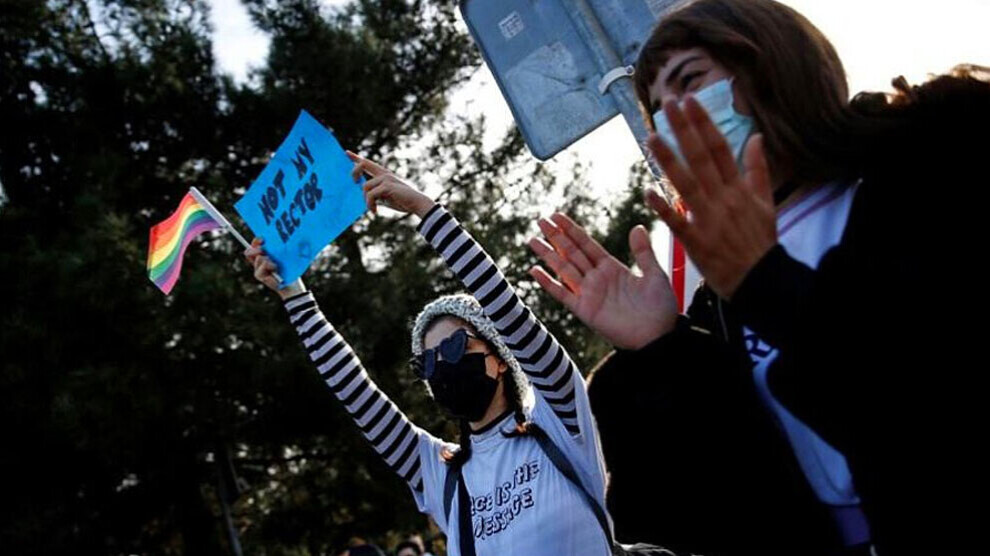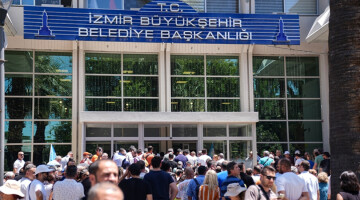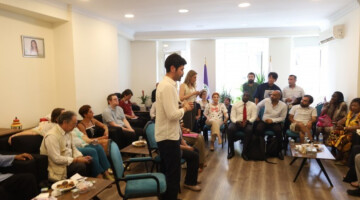Journalist Hakkı Özdal says that the government's reaction to the demonstrations in the Boğaziçi University is not different from what they have so far done to the opposition. Özdal states that the AKP-MHP government, which now has a more fragile electoral base, is intimidating both the opposition and individual citizens to make sure that they do not seek another option. Özdal believes that the events at Boğaziçi are the consequences of the failure to raise a strong voice when the trustee policy was first implemented in Kurdistan. ANF interviewed Journalist Özdal about the government’s recent crackdown on universities and opposition.
As you mentioned in one of your articles, this process began with appointment of trustees in Kurdish cities. In fact, when the elections for rectors were abolished, a similar process started for all universities. So, what made the Boğaziçi university different?
It was not about dealing with municipalities and universities in similar ways, but it was a procedure that started with the municipalities in Kurdish cities. With the trustees appointed to the municipalities, the right to elect and be elected as a whole was taken away. If you think about it, the situation at universities is even worse than anywhere else. This situation became a form of governance of the AKP-MHP government with the state of emergency that started after the failed coup attempt in July 2016. This is a method of execution of power because the government does not have any method. The right to elect and be elected in Turkey has been removed for everyone except AKP-MHP supporters.
In fact, appointments have already been made at many universities, but it has been different with Boğaziçi. On the one hand, AKP was confronted with the determination of the students. However, Boğaziçi University has always been valued by the liberal democrats most of whom are represented in top business association TÜSİAD (Turkish Industry and Business Association) and by the elites who have had a voice in the government since 1980. The managers of the top companies are mostly Boğaziçi graduates. I am not saying this for criticism, but Boğaziçi is a university based on liberal and bourgeois democratic values that are valid on a global scale. Apart from the leftists, the Kurdish movement, the CHP and the Alevis, the government now wants to fight the class that we call liberal, bourgeois democrat. This conflict with the opposition also confirms how much power the government has actually lost and the fact that the AKP closing itself to the others.
The AKP placed snipers at universities, attacked demonstrations, including support actions. From LGBTI + to anti-religion sentiment, it has actually used all the tools that it had put forward against the opposition so far. The fear of a new Gezi uprising has been voiced a lot. Considering that, what is the position of the AKP-MHP government in the face of the protests?
Snipers on the roofs, the arrests related to the protests against trustees are not new to Turkey's agenda as you say. These were done especially when trustees were appointed to HDP municipalities. Snipers were also put on the roofs at that time, high-level police measures were taken. But the struggle for democracy in Turkey has a particular weakness in this regard. Nobody protested when the government appointed trustees to the HDP municipalities. A phrase that appeared in Gezi Park protests summarizes this: "We have been watching the Kurdish cities through the eyes of this media for 30 years." But it seems that nothing was learned from Gezi either. While trustees were appointed there, for example, the opposition in the parliament, the CHP, and large groups did not react. The government is now using all the experience it gained there. Well, the government has been in a serious economic crisis since the end of 2017, and this crisis is not a situation that can easily be overcome since it covers all the actions taken for its 18-year rule. Even within capitalism, this crisis needs solutions called bitter pills to swallow.
As in bitter pills that brought the AKP to power in 2002?
Yes, but these solutions, which brought the AKP to power in 2002, are a set of solutions that also removed the politicians who were at the center at that time. Because the people know that it is the government that makes themselves swallow bitter pills. On the one hand, the AKP-MHP government is under the pressure of this because it cannot introduce regulatory moves. Since they have a very fragile electoral base, they always need new elections and referendums in order to maintain their legitimate existence. The AKP's position shows how it is stuck between these two options. Because as the AKP loses its support circle outside, it adopts oppressive policies. It intimidates both the opposition and individual citizens not to look for other options. Looking at Erdogan's recent speeches, there are no promises for the future. He keeps talking about abstract concepts such as a new constitution and a judicial reform but has no concrete proposals.
Well, what does the government hope with this pressure, or is it saving the day with discourses such as the constitution, judicial reform, albeit abstract, or is the AKP capable to renew and design itself?
In fact, Erdogan and his administration are trying to gain some more time. Because they think in this way: now vaccinations are being made all over the world, there is also the stagnation brought about by the epidemic. It is very likely that the epidemic will end by early summer, we'll get back to normal life and Turkey will attract foreign investors again. When foreign investors come, this crisis will loosen for a while, and this situation will generate new developments politically. If people's business goes well, then their reaction to the government will diminish.
In other words, it is exactly the same as the scenario 18 years ago. In other words, it is waiting for the conditions that brought it to power to be re-established, there is no new formula ...
Yes, even 18 years ago, if Bahçeli had not said "let's go to early elections" and broken the coalition government, if this coalition that implemented the Dervish program had lasted for a few more years, they could have experienced this improvement. Therefore, the AKP might not have come to the power with such a high rate of votes. AKP benefited from the policy of bitter pills that had been introduced before itself. It wants to gain time by suppressing society and opposition, crushing any democratic voice and waits for money from the outside to make partial adjustments to the economy. It needs time. But on the other hand, it needs to prove itself again as it shrinks politically. Otherwise, people will turn to other places. Therefore, this new constitution debate also corresponds to this rush.












